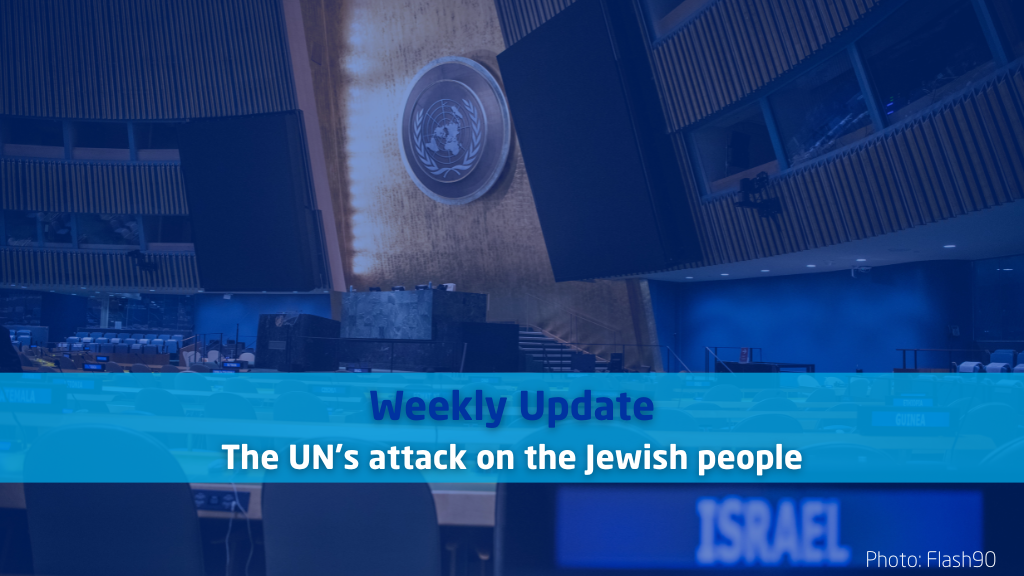The UN’s attack on the Jewish people
In late September, the UN General Assembly will probably be asked to adopt a resolution that “the State of Israel’s continued presence in the Occupied Palestinian Territory (OTP) is unlawful”, and that Israel must “bring its presence in these territories to an end as rapidly as possible”. The OPT is defined as the “West Bank” including East Jerusalem, and Gaza.
Such a resolution would be an all-out attack on the existence of Israel as an expression of the self-determination of the Jewish people and will inevitably lead to further violence. It is therefore critical that UN member states oppose such a resolution.
In December 2022, a group of 87 UN member states in the General Assembly had asked the International Court of Justice (ICJ) to give its opinion about the legal consequences of Israel’s “prolonged occupation of the Occupied Palestinian Territory”. The Court published its long-awaited Advisory Opinion a month ago, on Friday, July 19, 2024.
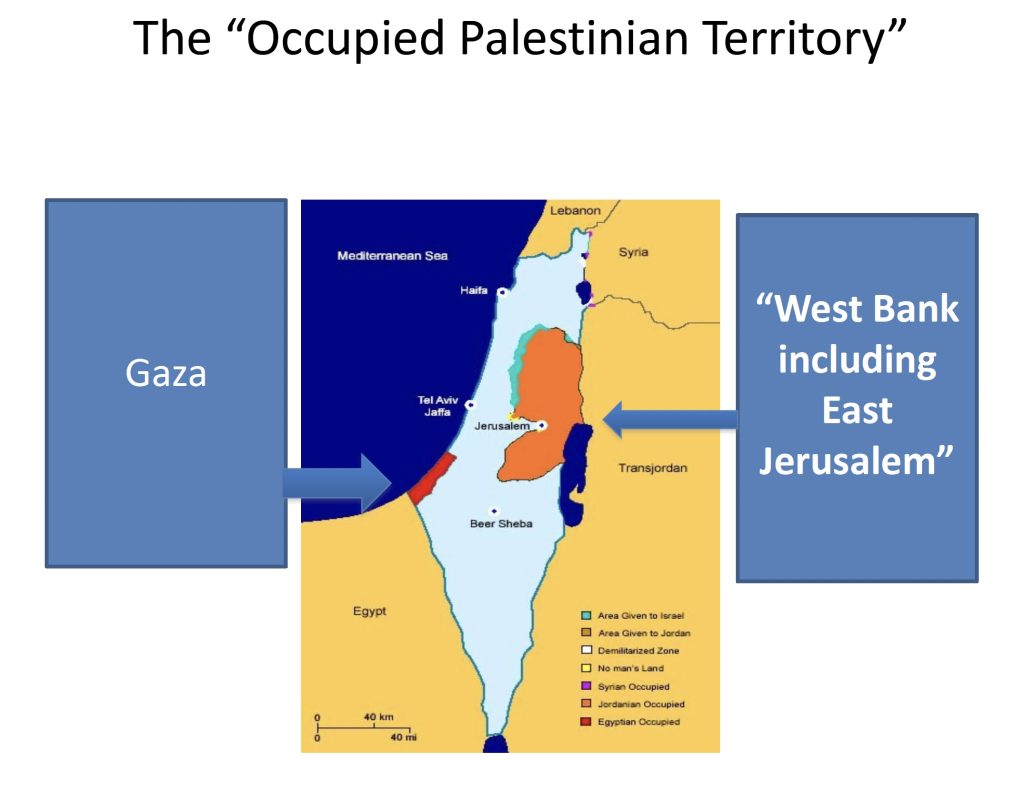
The “Occupied Palestinian Territory” | Image: YEASHA Council
According to eleven of the Court’s fifteen judges, Israel’s ongoing presence in the OPT since the June 1967 Six Day War violates the Palestinian right to self-determination and is therefore illegal. They call on Israel, the UN and all UN member states to bring Israel’s presence in the OPT to an end “as rapidly as possible”. Furthermore, all Israeli “settlers” in these territories must be “evacuated.”
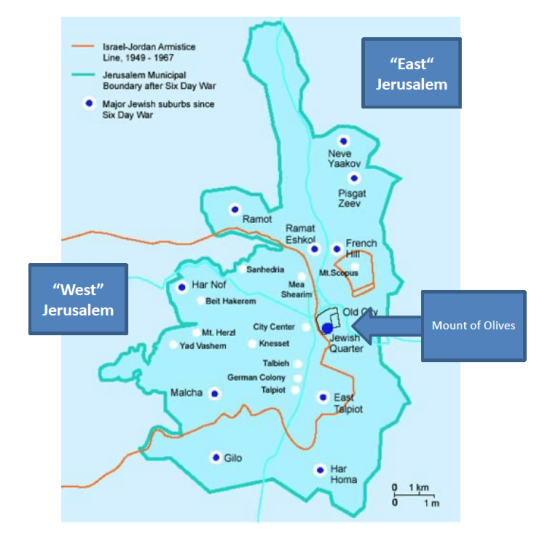
Jerusalem | Image: YEASHA Council
Four of the judges were highly critical of the majority’s Opinion. One judge – Vice-President Sebutinde – rejected the Opinion and issued a Dissenting Opinion.
In her 40-page Dissent, Judge Sebutinde clearly articulates the factual and legal flaws underlying the majority’s opinion. For example, the Court assumes that the Jewish people have no connection with these so-called “occupied” territories, but does not even inquire into the history of this territory or conflict. According to the Court, “occupation consists of the exercise by a state of effective control over foreign territory”. Yet the Court, by its own admission, makes no inquiry into the question whether Jerusalem, Judea and Samaria are “foreign territory”. In fact, the Court provides no factual evidence or legal reasoning to support the conclusion that these territories are “Palestinian”. At what point in time did they become Palestinian? The Court provides no answer.
Instead, the ICJ has unquestionably adopted the historical and legal narrative of the Palestinian side, that denies any Jewish connection with the land, and ignores Israel’s legal and historical rights and its legitimate security interests.
“It is critical that UN member states oppose such a resolution.”
The call for evacuation of settlements means that all Jews must be removed from the Old City of Jerusalem, Judea and Samaria – the historical heartland of the Jewish people. This is not only totally absurd and impractical, but also unjust as it completely ignores the fact that Jews have been living in Jerusalem, Judea and Samaria for millennia. Many Israelis living in these areas are living on properties owned by their families for centuries or purchased in good faith.
Labeling Jewish residents of “East Jerusalem” as illegal settlers, and calling for their “evacuation”, is highly objectionable. Not only does this amount to ethnic cleansing, the history of Islamic domination of Palestine shows that, should East Jerusalem (where almost all Holy Places are located) come under an Islamic Palestinian government, Jews and Christians will have limited access to their holy places, if any.
The Court also fails to consider the extremely complex and challenging security realities in the West Bank. Ever since 1967, calls for Israeli withdrawal from the territories conquered by Jordan and recaptured by Israel in 1967 have always respected Israel’s right to secure borders, as well as termination of all belligerency and threats of violence. This was the thrust of UN Resolutions 242 (1967) and 338 (1973), as well as in the Oslo Accords of 1993.
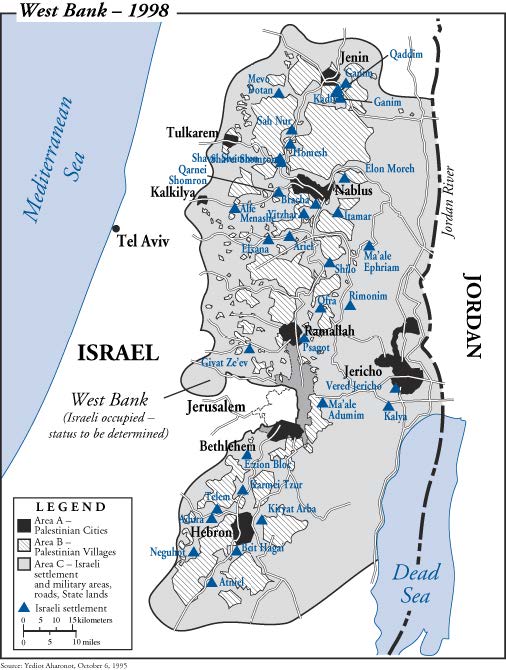
WEST BANK AFTER OSLO:
450,000 Jews
2 million Palestinian Arabs
It is indisputable that Israel faces ongoing existential and security threats and that there are states and non-state organizations that not only seek to force Israel out of the OPT but also desire a Palestine free of Jews from the “river to the sea” and legitimize a jihad (holy war) for this purpose. Hamas, Palestinian Jihad and other extremist terror-groups sponsored by Iran are deeply embedded in Palestinian society not only in Gaza but also the West Bank.
“The ICJ’s legal opinion ignores all of this.”
The one-sided character of the Advisory Opinion is the result of a one-sided process. The Opinion was requested by the UN General Assembly in December 2022 in Resolution 77/247. The ICJ was asked to clarify the legality of “the occupation, settlement, and annexation of the Palestinian territory occupied by Israel since 1967.” Less than half (87) of the 193 member states voted for the resolution, including the Arab League countries, such as Egypt, Lebanon, Syria, Somalia, Yemen, and Iraq, many African countries, and Palestine, which is not a full UN member but has observer status and is represented by the Palestinian Liberation Organization (PLO). Additionally, individual Western countries like Ireland, Spain, Norway, and Switzerland supported the resolution. The USA, Germany, the UK, France, Canada, Israel, and another 20 member states opposed the resolution but were outvoted.
Between July 2023 and February 2024, about 35 States overwhelmed the Court with written and oral submissions that denied the fundamental legitimacy of the Jewish state and accused it of every possible crime under the sun.
No mention was made of the Palestinians’ rejection of the two-state solutions over the decades. No mention of Islamist terrorist groups in the occupied territories driven by the desire to kill as many Jews as possible. No mention of Iran’s sponsorship of this terrorism.
“Bizarrely, during the oral hearings in February this year, October 7th was barely mentioned at all.”
Four of the judges (Sebutinde, Tomka, Abraham and Aurescu) were highly critical of this legally and factually one-sided Opinion devoid of historical context. According to Judge Sebutinde:
“The Advisory Opinion … omits the historical backdrop that is crucial to understanding this multifaceted dispute. As a result, the Advisory Opinion is tantamount to a one-sided “forensic audit” of Israel’s compliance or non-compliance with international law, that does not reflect a comprehensive, balanced, impartial, and in-depth examination of the pertinent legal and factual questions involved. It overlooks the intricate realities and history of the territories and populations within modern-day Palestine, specifically the areas referred to as the “Occupied Palestinian Territories” (OPTs).”
By concluding that the Palestinians have absolute rights to control all of the “Occupied Palestinian Territory”, the Court also undermines the Oslo Accords and the legal framework established and endorsed by the Security Council for resolving the conflict based on negotiations leading to an agreed balance between Israel’s right to security and territorial integrity, and Palestinian self-determination claims. The Opinion means that the Palestinians have no incentive whatsoever to negotiate.
The legal opinion is not binding, either on the parties to the conflict or on third states. However, it has huge political significance. Many will see it as an authoritative statement of the law and history applicable to this dispute. Tragically, by buying into the narrative that denies Jewish nationhood and ignores the religiously driven hatred of the Jewish people in the region, the Court’s Opinion will further incite violence from the Palestinian territories.
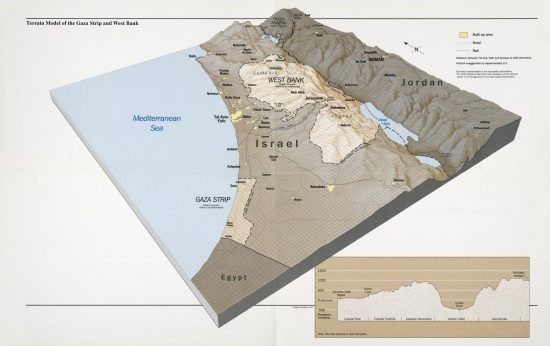
Terrain Model of Israel, the Gaza Strip and Westbank | Image: Wikimedia Commons
In light of the events in Gaza since Israel’s withdrawal in 2005, Israel, of course, cannot comply with demands to unilaterally vacate these strategically critical territories.
It is likely that a resolution will be tabled at the UN General Assembly in September, calling on all UN member states to adopt and implement the Advisory Opinion.
Let us hope and pray that many nations will vote against such a resolution.

One-sided Advisory Opinion; Israel’s security concerns are not considered.
The Opinion completely lacks historical context. The Court assumes that the Jewish people have no connection with these so-called “occupied” territories. It does not even inquire into the history of this territory or conflict. Instead, the ICJ has unquestionably adopted the historical and legal narrative of the Palestinian side, that denies any Jewish connection with the land, and ignores Israel’s legal and historical rights and its legitimate security interests. In her Dissent, Judge Sebutinde clearly articulates the factual and legal flaws underlying the majority’s opinion. We highly recommend all interested persons to study her Dissent closely.”
> Read more..
The UN World Court war against the Jews
When Hamas welcomes the ‘advisory opinion,’ the rest of the world should immediately realize that anti-Israel bias is at play.
> Read more..
The ICJ overlooks the intricate realities and history
Judge Julia Sebutinde: “The Advisory Opinion, while addressing key legal matters and factual determinations central to the conflict — including Israel’s alleged occupation, annexation of the disputed territories, and the Palestinian right to self-determination — omits the historical backdrop that is crucial to understanding this multifaceted dispute. As a result, the Advisory Opinion is tantamount to a one-sided, “forensic audit” of Israel’s compliance or non-compliance with international law, that does not reflect a comprehensive, balanced, impartial, and in-depth examination of the pertinent legal and factual questions involved. It also overlooks the intricate realities and history of the territories and populations within modern-day Palestine, specifically the areas referred to as the “Occupied Palestinian Territories” (OPTs). To be able to render an opinion that is both substantive and equitable, and that genuinely aids the General Assembly and Security Council in resolving the Israeli-Palestinian conflict peacefully and permanently in line with the UN Charter, it is essential to thoroughly examine these issues, informed by the relevant principles of international law, including those I highlight in this dissenting opinion.”.
> Read more..
Zachariah 12:1-6
A prophecy: The word of the Lord concerning Israel.
The Lord, who stretches out the heavens, who lays the foundation of the earth, and who forms the human spirit within a person, declares:
2 “I am going to make Jerusalem a cup that sends all the surrounding peoples reeling. Judah will be besieged as well as Jerusalem. 3 On that day, when all the nations of the earth are gathered against her, I will make Jerusalem an immovable rock for all the nations. All who try to move it will injure themselves. 4 On that day I will strike every horse with panic and its rider with madness,” declares the Lord. “I will keep a watchful eye over Judah, but I will blind all the horses of the nations. 5 Then the clans of Judah will say in their hearts, ‘The people of Jerusalem are strong, because the Lord Almighty is their God.’6 “On that day I will make the clans of Judah like a firepot in a woodpile, like a flaming torch among sheaves. They will consume all the surrounding peoples right and left, but Jerusalem will remain intact in her place.
